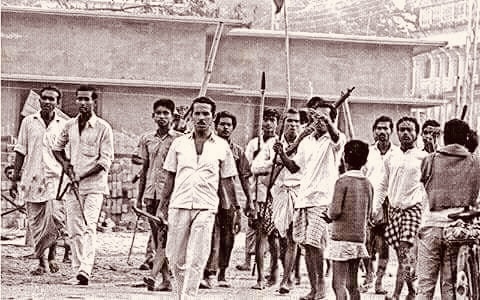In the annals of the Liberation War, an extraordinary event unfolded in the city of Pabna: the inaugural resistance battle against the Pakistani military. Over the span of two relentless days on March 28th and 29th, nearly 200 Pakistani soldiers met their fate in Pabna. Following this valiant stand, Pabna enjoyed a reprieve from enemy occupation for a fortnight.Under the cloak of night on March 25th, a well-prepared contingent of Pakistani soldiers infiltrated Pabna, swiftly establishing their command center in the Circuit House, nestled within the Wapda Colony. In a meticulously orchestrated maneuver, they swiftly commandeered the aging telephone exchange, severing all telephonic communications within and beyond Pabna’s borders. The Rest House of the District Council was likewise commandeered and repurposed into a den of torment. Pakistani troops were strategically stationed across the urban landscape.Come daybreak on March 26th, propaganda-laden vehicles began to patrol the city, heralding the imposition of a curfew. Morning light bore witness to a relentless assault upon the civilian populace of Pabna. As twilight descended, with the aid of local collaborators, several political figures, including MP Advocate Amin Uddin Ahmed, NAP leader Dr. Amalendu Daxis, and Syed Talukdar, proprietor of the Tripti Niloy Hotel, were apprehended from their domiciles. Those evading capture remained concealed elsewhere.As night fell on March 27th, following the cessation of the Maghrib call to prayer, an armed army convoy descended upon Pabna, launching an assault upon the police line. The city’s precinct was besieged, claiming the life of a sentry. Police officers and youths took up strategic positions atop the jail, head post office, registry office, and magistrate’s court, their weapons trained upon the streets. The sudden appearance of the army convoy triggered a barrage of gunfire from all quarters. The assailants beat a hasty retreat, leaving behind fallen comrades. Under the cover of darkness, their fallen were hastily retrieved, and they retreated without further engagement.On the eve of March 28th, Pakistani forces launched a renewed offensive against the police line in Pabna. Faced with steadfast resistance from the local constabulary, they were repelled at great risk. Led by Rafiqul Islam Bakul, the people of Pabna valiantly defended their city against the invaders, with the gates of the jail flung open to accommodate the freedom fighters. Sustaining considerable losses, the Pakistani forces were forced to withdraw. Seizing the opportunity, Pabna’s populace, joined by law enforcement, launched a counterattack at the adjacent Tardas Building, where the Pakistani forces had regrouped. By 9:00 AM, under Bakul’s leadership, the combined forces delivered a decisive blow, claiming the lives of 28 Pakistani soldiers.In the ensuing days, the echoes of battle resounded across Pabna. Major Aslam and Officer-in-Charge Abdul Jalil were among the fallen, their sacrifice commemorated in the annals of the Maligachha skirmish and subsequent engagements at Madhopur, Dashudiya, Ishwardi, and Lalpur. The liberation of Bishikh uncovered numerous casualties, including notable figures such as Advocate Amin Uddin, Dr. Amalendu Daxis, Syed Talukdar, and Rajan Pagla.By March 29th, Pabna was heralded as the vanguard of liberation, standing as the first district to shake off the yoke of occupation. The city remained untainted by enemy presence until April 11th.
Information: Amirul Islam Ranga
Translated By: Mehedi Hasan Himel

